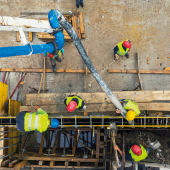Attitudes to decarbonisation and direct electric heating

ThermoSphere’s Managing Director Alistair Bell considers attitudes to decarbonisation and direct electric heating in the construction industry
Since the UK government set its 2050 target for net zero, efforts have been made across the economy to reduce emissions. In the construction industry that has meant decarbonising supply chains, replacing non-renewable energy with renewables and using low-carbon heating methods. In fact, the most recent Climate Change Committee (CCC) parliamentary report highlighted that for the UK to meet its 2050 net-zero target, at least half of the current heat demand for buildings must be supplied by low-carbon sources by 2035.
The transition to low-carbon heating is therefore essential and applies to all construction across the UK. Yet the transition is more pressing for residential buildings. Residential homes are by far the largest contributor to UK buildings emissions. Building emissions make up 20% of the UK total emissions and residential homes account for almost 80% of that total.
It is against this backdrop that the Working Towards Net Zero report, commissioned by UK-based electric heating manufacturer ThermoSphere, revealed attitudes towards the decarbonisation of heating and direct electric solutions within the construction industry. The construction sector sees the need for change. It sees insulation and low-carbon heating as essential to making that change, especially when paired with renewable tariffs. And it sees decarbonisation as a challenge and opportunity for growth, with upskilling the future workforce a necessary step to realising that opportunity. However, decarbonising heat in UK buildings is not a single solution problem. Several methods must be used to reach the UK government’s goals.
Priorities
The report reveals that 48% of construction workers rank installing low-carbon heating as the most or second-most important method for reducing carbon emissions. Above that, efficient insulation is seen as the top priority.
As the UK grid incorporates more renewable energy, direct electric heating has become a viable low-carbon heating method for the construction industry. Ultimately it is the electricity grid’s generation mix that determines the carbon intensity of any form of electric heating. So, as renewables continue to replace fossil fuels, electricity is becoming a lower-carbon source of energy. Pairing a direct electric heating method, such as underfloor heating or electric radiators, with a renewable electricity tariff will prove to be one of the most effective ways of decarbonising heating in residential and non-residential settings.
It is acknowledged that new homes need low-carbon heating, but what about existing homes? There are 29 million homes that need to have low-carbon heating methods retrofitted by 2050, which is one of the main priorities for the CCC. Working Towards Net Zero shows 62% of industry professionals see retrofitting is the single biggest challenge to decarbonisation. The report also showed that, of those surveyed, direct electric heating is seen as a better overall solution by almost half, second to the use of hydrogen boilers.
While hydrogen boilers and heat pumps are popular, the report showed that they’re not seen as suitable for the varied UK housing stock. 52% of industry professionals asked in the report believe that direct electric solutions are the right solution for modest properties and apartments, due to the fact they’re smaller, easy to install and do not require external equipment incompatible with multi-storey buildings.
Prices and demand rise
The report also showed an increase in consumer interest in low-carbon heating alternatives, but current energy prices are high and electricity is often unfairly seen to be a more expensive form of energy than oil or gas. This is acting as a deterrent on the uptake of low-carbon direct electric alternatives with 79% of respondents saying that high running costs have deterred customers from installing direct electric heating.
What’s required is a change of image. Too many people have negative associations based on old, outmoded electric heating solutions like storage heaters.
Of the respondents, 71% said they believed these older electric heating methods have a negative impact on how consumers perceive modern, low-carbon direct electric alternatives. Modern direct electric heating solutions are more efficient than older solutions and direct electric is efficient at the point of usage, compared to gas heating where energy is lost throughout the system. They also require lower installation and maintenance costs and won’t be phased out by the UK government over the next 15 years (unlike gas).
The industry is keen to use low-carbon direct electric heating solutions, particularly in retrofitting older, less spacious buildings and in multi-storey buildings. But the industry also sees the challenge of retrofitting as an opportunity for growth – 64% of those surveyed believe decarbonisation is an opportunity.
However, as with many areas in the UK economy, there is a skills gap between the currently available talent and the required talent – as reported by 69% who said there isn’t sufficient workforce expertise to embrace the opportunity.
What’s needed is a concerted effort to upskill the current workforce. Crucially, direct electric poses a less of a challenge to upskilling (easier to install, particularly in buildings that have restricted space) compared with other low-carbon heating methods, such as heat pumps. If the industry can do this sooner rather than later, it won’t miss the chance for growth and it will more easily meet its own decarbonisation goals.
Download ThermoSphere’s Working towards Net Zero report at thermosphere.com/working-towards-net-zero-press








